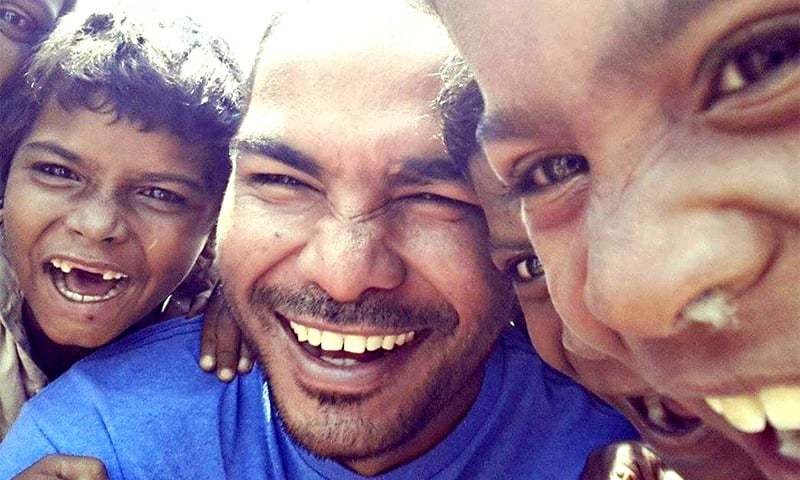
Courtesy of Dawn News, Pakistan
Muhammad Sabir has been building a city for 13 years. It sits on the edge of Lahore, Pakistan’s second-largest city: an ocean of tents. It is bustling, struggling, and surviving. He calls it Slumabad.
Situated near the frequently flooding River Ravi and the sewage channels flowing out of the city, the historically nomadic community settled there has been steadily growing in size for years. They work as trash collectors, home workers, beggars, selling and trading, hoping to earn enough to eat that evening.
Belonging to a nomad family, Muhammad Sabir, the eldest of nine, was expected to work to support his family since childhood. He would accompany his father to clean wealthy neighborhoods, all the while watching other children — dressed in pressed uniforms — on their way to school.
“At the same time, you could see children picking garbage from homes, while others sat in their nice cars, with their beautiful uniforms. It was such a contrast, where they were drawn to their destiny, and we had been given ours: picking trash.”
It was during such collections, as he picked up discarded newspapers, that he began to implement the only reading method he had learned, from the Arabic of the Quran, onto these words. Slowly, he worked through the words, banking on the organic overlap of sound that existed in Urdu and Arabic, and taught himself how to read.
Chuckling, he recalls how he would sit atop garbage piles, poring over each letter, until he was devouring pages of text. Soon after, he approached his father, insisting he wanted to go to school, only to be rejected immediately.
Yet he persisted asking, and eventually, bargaining with his father.
“I never felt I was a child. I knew how to bargain, how to survive. How to not go hungry. That was my power,” he recalls, laughingly.
Sabir knew his parents needed him to work, and by refusing to work, despite thrashings and punishments, he eventually convinced his father to send him to the nearest public school. He would wake up at dawn, collect metal to sell, then put on his blue, state-issued uniform, and leave for school. In the summer evenings, he’d sell water bottles at the bus stop; in winter, warm eggs at the teashop. In stolen pockets of time, he would read.
In the 5th grade, he faced a new challenge: English. It was sharp and unknown, and he was deemed strange by his community members for bothering with school, let alone a foreign language. School brought its own hurdles, with teachers and fellows alike taunting him about his dirty uniform, how he smelled, and how little he was going to amount to. Yet again, Sabir held fast to his love of reading — the travel and treasure of it —and got to work.
In the years that followed, Sabir graduated high school and college, working to support his family through after school tuitions. He was infamous, the only man in the community to wear trousers and shirts, with childhood companions who’d once thought him “ a bad influence” now asking him to tutor their children.
Sabir believes they saw that his path had diverged from theirs. They followed their fathers, but he had carved out a road of his own, and now wanted the children in his community to do the same. So, slowly, he began to teach the kids in the neighborhood, gathering them together and working through the basics of reading.
“ I don’t add values with the word ‘education’. It is a technical term: to know literacy and numeracy. Having these tools doesn’t civilize me differently, or give me an edge. It doesn’t tarnish the equality of those who don’t possess them.”
Sabir wanted people to know that they were no less worthy of respect and a fair chance at carving their own paths, and he believed learning could do that. He sought to elevate his community, much like those books he read, perched atop the garbage pile all those years ago, had done for him.
While education may have been his goal, he could not ignore the pressing issues, namely, the lacking healthcare facilities and harassment from private developers, that plagued the slums. He found himself battling these hurdles, to give his people that chance at a brighter life.
What started out as a makeshift school in a slum gradually expanded into a city moving towards change, an effort, to rise above. He began calling it ‘Slumabad’.
In the years that followed, inspired by Sabir’s tirelessness, volunteers poured in, sponsors sprouted up and international recognition elevated the initiative. It seemed like Slumabad was on a long, hopeful path — and then the pandemic struck, bringing with it the most profound challenges of Sabir’s life.
The waves of mass unemployment and starvation were unlike anything Sabir had ever seen in the slums before. He recalls, “It became clear to me, when I went for a relief drive, and had people looking at me like a messiah because I had a ration bag in my hand. There was a line between people who had food, and people who did not.’
It was, in the end, the enduring support of his team, and the visionary, Muhammad Sabir, inspired by Dickens, the dreams of Wonderland, the ideals of Lincoln, that compelled Slumabad to adapt, to fight the tide and terror in its own way.
Today, Sabir continues his work, holding ration drives, rebuilding flood-stricken homes, and providing sanitation goods. At the same time, he sustains his own dream- a chance for his community’s children to have a pure and beautiful life. Lives filled with potential, where everyone’s paths, no matter who takes them, are free of barriers, and brightness looms ahead.






